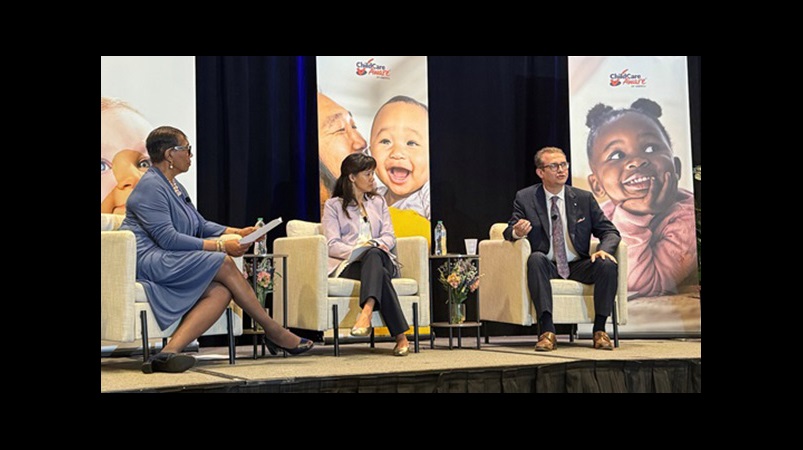
Raising child care. Raising America. That was the theme at May's Child Care Aware of America (CCAoA) National Symposium in Washington, D.C. People from across the country gathered to seize an opportunity that exists despite today’s child care crisis—to make child care stronger in America.
The Institute’s Executive Director Walter Gilliam and Director of Policy Linda Smith were both keynote speakers at the symposium.
Several additional members of the Buffett Early Childhood Institute participated in the event, bringing the perspective and stories of Nebraska to the child care conversations happening at the national level.
Smith, joined by Mario Cardona of the White House Domestic Policy Council and Celia Hartman Sims of The Abecedarian Group, LLC, opened the event. All three were key leaders who helped design the 2014 Child Care and Development Block Grant (CCDBG), key legislation which reshaped federal support for child care. The group shared their expertise on how best to move toward high-quality child care for families across the country.
Smith noted the importance of bringing more people to the table, including those from businesses, faith communities, and health care.
"We got a long way on the child advocacy by ourselves,” Smith said. “I don't think we're going to get a lot further until we engage more people in the conversation.”
Additionally, Smith emphasized how public opinion has shifted—child care is more than a family issue, it’s a business and economic issue, too.
"The most valuable things to come out of the last few years is a realization that this is a business,” Smith said. “There's both a supply and demand side of the equation. The public gets that now, they understand. We've made the case for the economic impact.”
New this year was a focus on the essential role child care plays in improving health disparities, the theme of the closing keynote session featuring Gilliam.
Gilliam was joined by Dr. Charlene Wong from the U.S. Centers for Disease Control and Prevention for a conversation on early childhood mental health. Both noted how this encompasses prevention and care not just for children, but for families and the early childhood workforce, too.
“We can’t talk about the health and wellbeing of young children without talking about the health and wellbeing of those who care for young children,” Gilliam said.
The conversation highlighted the importance of partnerships between medical professionals and early childhood providers so every child can learn, grow, and build lifelong healthy behaviors.
“We have to work in partnership if we’re going to have kids be healthy, safe, and ready to learn,” Wong said.
Wong stressed the impact early childhood teachers have in building trust and buy-in with families, which are key in health prevention and care.
Early childhood educators are part of the team that supports families in our communities, and they need to be taken care of as well.
“How much we truly care for our young children can be measured by how much we care for those who care for our young children,” Gilliam said.
The symposium also included visits to the U.S. Capitol, where the Institute team connected with congressional leaders to discuss child care realities in Nebraska and beyond.
The Buffett Institute is helping to spread the message in Nebraska and nationwide—child care is vital to the future and success of communities across America.
Erica Sesay is the associate director of communications at the Buffett Early Childhood Institute. In this role, she manages the day-to-day operations of the communications unit and leads events, project management, internal communications, database creation and management, and more.

